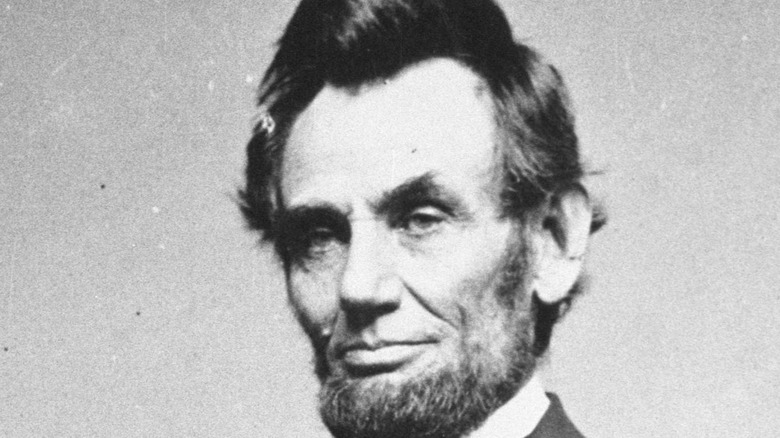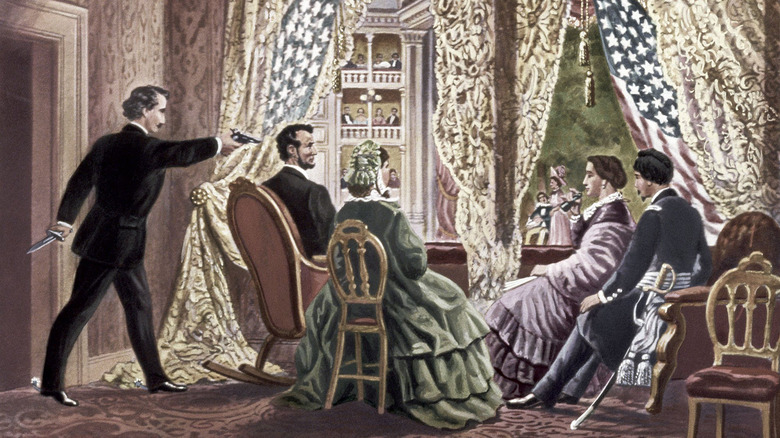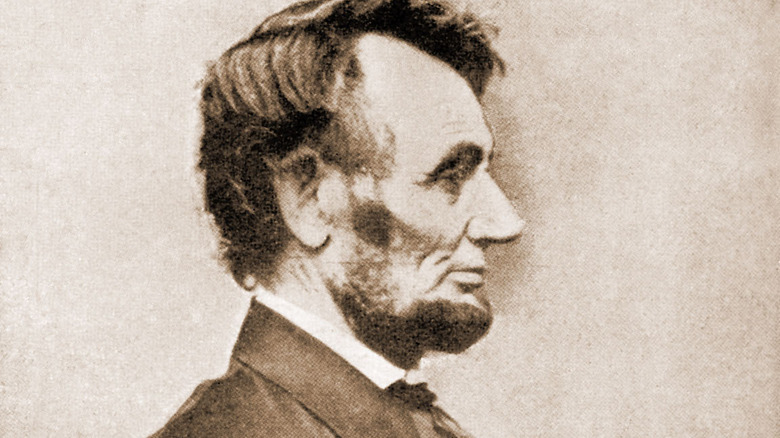The Abraham Lincoln Theory That Would Change Everything
Abraham Lincoln, the 16th President of the United States, was assassinated on the night of April 15, 1865, according to History. That is an undeniable and unimpeachable fact about which there is no ambiguity in the annals of American history. Further, it's known for certain that he was shot and killed at Ford's Theatre while he watched a play — "Our American Cousin" — slain by a disgruntled actor and Confederate sympathizer named John Wilkes Booth. The actor jumped from the president's box seat, injuring his ankle in the process while the audience laughed, thinking it was part of the show. Meanwhile, the fatally injured president was taken to a boarding house across the street, where he later died.
Except what if that's not what actually happened? Like so many other important turning points in American history, speculation and alternative theories abound. It's been suggested that perhaps Booth wasn't tracked down and killed, the history books have said, and that there were sightings of him in the years that followed (via The Philadelphia Inquirer). Some claim that Booth actually went on to live for another 38 years after the assassination and that the body recovered from a barn in Virginia — which most agree belonged to Booth — wasn't his at all.
What if Lincoln and some co-conspirators managed to pull a fast one on history, and the president actually faked his own death? He certainly had reason to, and there may be the slightest bit of evidence that, reviewed in the right frame of mind, could back up the notion that his death was a deliberate, elaborate hoax.
Lincoln definitely had reason to fake his death
John Wilkes Booth was almost certainly not the only person who wanted Abraham Lincoln dead following the end of the Civil War, and of course, the president and his team knew that. As such, had Lincoln successfully pulled off a faked assassination, he could have convinced his enemies that he was already dead and then, in some way or another, managed to escape and live out his remaining years in safety. What evidence is there that this actually happened? Little to none, really, and what there is more circumstantial than anything. Nevertheless, as Abraham Lincoln Online points out, some doctors believe that Lincoln's wounds were survivable. Further, accounts of what happened that night, taken from different doctors, are contradictory.
"Unfortunately, depending on which account you read, you'll find that there could have been a different path of the bullet. If you only read one or two of the reports, in theory Lincoln could have survived, particularly today with our medical care," said Blaine Houmes, an emergency medicine doctor who has studied the Lincoln assassination. "But if you read all the others, there's no way he could have survived, due to the severity of the injury. In a couple of the accounts they claimed that the bullet went straight forward; if you read other accounts, it went diagonally and ended up somewhere above or behind the right eye." The sad fact is, given the majority of descriptions of Lincoln's wounds, the president could not have survived, not even if he'd received 21st-century medical attention.
Did Lincoln foresee his own death?
Looking at the matter from a slightly more occult angle, there's also the allegation that Lincoln was apparently fixated on his own impending death for several days prior to it actually happening, reportedly having told others about premonitions and/or dreams about it. "I believe there are men who want to take my life ... and I have no doubt that they will do it. But if it is to be done, it is impossible to prevent it," he said, according to Abe Lincoln History.
The story goes that Lincoln told William H. Crook, one of his bodyguards, that he had been having dreams or visions of his impending assassination. Crook was allegedly so disturbed by Lincoln's dreams that he offered to accompany the Lincolns to Ford's Theatre. However, Lincoln declined the offer, saying that he couldn't afford to pay his bodyguard to work both a day shift and a night shift. Finally, in a last bit of "evidence" that he faked his assassination, the last words Lincoln said to his personal bodyguard, according to the book "The Assassination of Lincoln: History and Myth," were "Good bye," rather than the customary "good night." According to Crook's story, this was the first time the president had ever said that to him.
Conspiracies related to the Lincoln assassination go way back
Sometimes, conspiracy theories seem to be a byproduct of historical events being viewed through a modern lens, but there were conspiracy theories about what happened that night at Ford's Theatre and in the days that followed.
According to Ford's Theatre, this was because emotions were running so high and there was a high level of misinformation. Immediate speculation fell on remaining members of the former Confederacy, including President Jefferson Davis or Secretary of State Judah P. Benjamin. Some factions in Lincoln's Republican party at the time carried strong anti-immigrant sentiments, which meant that some were willing to believe that Benjamin, who was Jewish, had alleged ties to European banks. The same reasoning can be applied to why others initially thought that high-ranking Catholics — or even the pope himself — had been involved in a plot to assassinate the president. Others suspected Irish immigrants, many of whom were Catholic and had tended to support the Democratic party and oppose the war.



